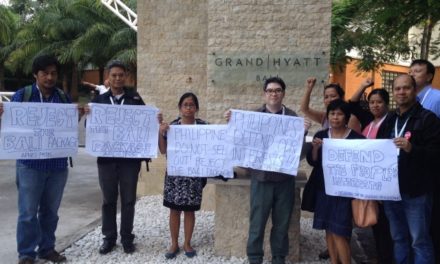 NAMA: Positions remain entrenched as developing countries demand to put ‘development dimension’ back in the negotiations
NAMA: Positions remain entrenched as developing countries demand to put ‘development dimension’ back in the negotiations
In the third day of trade negotiations in Hong Kong, the talks on Non-Agricultural Market Access (NAMA) while seem to be moving towards greater specificity, also remains bogged down by huge divergences on practically all the three main elements of the negotiations namely the formula, the flexibilities for developing countries and the issue of unbound tariffs.
 On the issue of the formula, the might bone of contention right now is on the number of coefficients in the formula with developing countries insisting on the use of multiple coefficients. There has also been a move to refocus the discussion on the formula away from the type of formula (whether Swiss, Swiss Type or whatever) to what many developing countries feel is the more important issue of impact of whatever type formula would be agreed upon.
On the issue of the formula, the might bone of contention right now is on the number of coefficients in the formula with developing countries insisting on the use of multiple coefficients. There has also been a move to refocus the discussion on the formula away from the type of formula (whether Swiss, Swiss Type or whatever) to what many developing countries feel is the more important issue of impact of whatever type formula would be agreed upon.
On flexibilities, developing countries remain insistent on safeguarding paragraph 8 flexibilities as a ‘stand alone provision. In a letter submitted to Mr. John Tsang, the Chairman of the 6 th Ministerial Conference, 11 developing countries which includes Argentina, Venezuela, Brazil, China, Egypt, India, Indonesia, Namibia, Pakistan, Philippines and South Africa, these countries drew attention to a number of core principles such as less than full reciprocity in reduction commitments and special and differential treatment that were agreed upon in Doha, remain central to the NAMA negotiations; the removal of tariff peaks, high tariffs and tariff escalation, and non tariff barriers in developed country markets on products of interest to developing countries, paragraph 8 as a stand alone provision of flexibilities, substantially increasing the level of bindings at appropriate and equitable levels.
There also greater insistence from developing countries to achieve some level of parallelism on the level of ambition on other market access negotiations particularly between NAMA and agriculture.
Ambassador Stefan Johanneson, the Chair of the NAMA negotiations apparently view these latest developments as constituting a risk of ‘backsliding’ from what he perceived to be convergence on major areas of the negotiations already.









